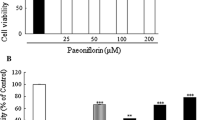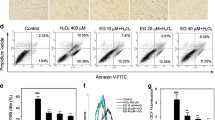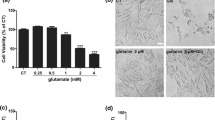Abstract
Previous research demonstrated that glutamate induces neuronal injury partially by increasing intracellular Ca2+ concentrations ([Ca2+]i), and inducing oxidative stress, leading to a neurodegenerative disorder. However, the mechanism of glutamate-induced injury remains elusive. Gastrodin, a major active component of the traditional herbal agent Gastrodia elata (GE) Blume, has been recognized as a potential neuroprotective drug. In the current study, a classical injury model based on glutamate-induced cell death of rat pheochromocytoma (PC12) cells was used to investigate the neuroprotective effect of gastrodin, and its potential mechanisms involved. In this paper, the presence of gastrodin inhibits glutamate-induced oxidative stress as measured by the formation of reactive oxygen species (ROS), the level of malondialdehyde (MDA), mitochondrial membrane potential (MMP), and superoxide dismutase (SOD); gastrodin also prevents glutamate-induced [Ca2+]i influx, blocks the activation of the calmodulin-dependent kinase II (CaMKII) and the apoptosis signaling-regulating kinase-1 (ASK-1), inhibits phosphorylation of p38 mitogen-activated kinase (MAPK). Additionally, gastrodin blocked the expression of p53 phosphorylation, caspase-3 and cytochrome C, reduced bax/bcl-2 ratio induced by glutamate in PC12 cells. All these findings indicate that gastrodin protects PC12 cells from the apoptosis induced by glutamate through a new mechanism of the CaMKII/ASK-1/p38 MAPK/p53-signaling pathway.





Similar content being viewed by others
References
An H, Kim IS, Koppula S et al (2010) Protective effects of Gastrodia elata Blume on MPP+-induced cytotoxicity in human dopaminergic SH-SY5Y cells. J Ethnopharmacol 130:290–298
Arundine M, Tymianski M (2003) Molecular mechanisms of calcium-dependent neurodegeneration in excitotoxicity. Cell Calcium 34:524–537
Azadmehr A, Oghyanous KA, Hajiaghaee R (2013) Antioxidant and neuroprotective effects of scrophularia striata extract against oxidative stress-induced neurotoxicity. Cell Mol Neurobiol 33:1135–1141
Birben E, Sahiner UM, Sackesen C et al (2012) Oxidative stress and antioxidant defense. World Allergy Organ J 5:9–19
Boronkai A, Bellyei S, Szigeti A et al (2009) Potentiation of paclitaxel-induced apoptosis by galectin-13 overexpression via activation of Ask-1-p38-MAPkinase and JNK/SAPK pathways and suppression of Akt and ERK1/2 activation in U-937 human macrophagecells. Eur J Cell Biol 88:753–763
CalìT Ottolini D, Brini M (2011) Mitochondria, calcium, and endoplasmic reticulum stress in Parkinson’s disease. BioFactors 37:228–240
Chae S, Lee AY, Lee H-W et al (2008) Three phenolic glycosides from Gastrodia elata. J Appl Biol Chem 51:61–65
Chen W, Li X, Jia LQ (2013) Neuroprotective activities of catalpol against CaMKII-dependent apoptosis induced by LPS in PC12 cells. Br J Pharmacol 169:1140–1152
Cheng YF, Zhu GQ, Wang M (2009) Involvement of ubiquitin proteasome system in protective mechanisms of Puerarin to MPP+-elicited apoptosis. Neurosci Res 63:52–58
Christophe M, Nicolas S (2006) Mitochondria: a target for neuroprotective interventions in cerebral ischemia–reperfusion. Curr Pharm Des 12:739–757
Coyle JT, Puttfarcken P (1993) Oxidative stress, glutamate, and neurodegenerative disorders. Science 262:689–695
Gross A, McDonnell JM, Korsmeyer SJ (1999) BCL-2 family members and the mitochondria in apoptosis. Genes Dev 13:1899–1911
Hirata Y, Yamamoto H, Atta MSM et al (2011) Chloroquine inhibits glutamate-induced death of a neuronal cell line by reducing reactive oxygen species through sigma-1 receptor. J Neurochem 119:839–847
Jiang GZ, Li JC (2014) Protective effects of ginsenoside Rg1 against colistin sulfate-induced neurotoxicity in PC12 cells. Cell Mol Neurobiol 34:167–172
Kim SJ, Ju JW, Oh CD et al (2002) ERK-1/2 and p38 kinase oppositely regulate nitric oxide-induced apoptosis of chondrocytes in association with p53, caspase-3, and differentiation status. J Biol Chem 277:1332–1339
Kim IS, Choi D-K, Jung HJ (2011) Neuroprotective effects of vanillyl alcohol in Gastrodia elata Blume through suppression of oxidative stress and anti-apoptotic activity in toxin-induced dopaminergic MN9D cells. Molecules 16:5349–5361
Kim BW, Koppula S, Kim JW et al (2012) Modulation of LPS-stimulated neuroinflammation in BV-2 microglia by Gastrodia elata: 4-hydroxybenzyl alcohol is the bioactive candidate. J Ethnopharmacol 139:549–557
Kumar H, Kim IS, More SV et al (2013) Gastrodin protects apoptotic dopaminergic neurons in a toxin-induced Parkinson’s disease model. Evid Based Complement Altern Med 2013:514095
Lau A, Tymianski M (2010) Glutamate receptors, neurotoxicity and neurodegeneration. Pflugers Arch Eur J Physiol 460:525–542
Li N, Liu B, Dluzen DE et al (2007) Protective effects of ginsenoside Rg2 against glutamate-induced neurotoxicity in PC12 cells. J Ethnopharmacol 111:458–463
Li G, Ma R, Huang C (2008) Protective effect of erythropoietin on b-amyloid-induced PC12 cell death through antioxidant mechanisms. Neurosci Lett 442:143–147
Liu Y, Templeton DM (2007) Cadmium activates CaMK-II and initiates CaMK-II- dependent apoptosis in mesangial cells. FEBS Lett 581:1481–1486
Ma S, Liu H, Jiao H et al (2012) Neuroprotective effect of ginkgolide K on glutamate-induced cytotoxicity in PC 12 cells via inhibition of ROS generation and Ca2+ influx. Neurotoxicology 33:59–69
Means AR, Dedman JR (1980) Calmodulin—an intracellular calcium receptor. Nature 285:73–77
Nagai H, Noguchi T, Takeda K et al (2007) Pathophysiological roles of ASK1-MAP kinase signaling pathways. J Biochem Mol Biol 40:1–6
Ojemann LM, Nelson WL, Shin DS et al (2006) Tian ma, an ancient Chinese herb, offers new options for the treatment of epilepsy and other conditions. Epilepsy Behav 8:376–383
Olanow CW, Tatton WG (1999) Etiology and pathogenesis of Parkinson’s disease. Annu Rev Neurosci 22:123–144
Orrenius S, Zhivotovsky B, Nicotera P (2003) Regulation of cell death: the calcium–apoptosis link. Nat Rev Mol Cell Biol 4:552–565
Peng TI, Jou MJ (2010) Oxidative stress caused by mitochondrial calcium overload. Ann N Y Acad Sci 1201:183–188
Rokhlin OW, Taghiyev AF, Bayer KU (2007) Calcium/calmodulin-dependent kinase II plays an important role in prostate cancer cell survival. Cancer Biol Ther 6:732–742
Salas MA, Valverde CA, Sánchez G et al (2010) The signaling pathway of CaMKII-mediated apoptosis and necrosis in the ischemia/reperfusion injury. J Mol Cell Cardiol 48:1298–1306
Satpute RM, Kashyap RS, Deopujari JY (2009) Protection of PC12 cells from chemical ischemia induced oxidative stress by Fagonia arabica. Food Chem Toxicol 47:2689–2695
Sheldon AL, Robinson MB (2007) The role of glutamate transporters in neurodegenerative diseases and potential opportunities for intervention. Neurochem Int 51:333–355
Shu C, Chen C, Zhang DP et al (2012) Gastrodin protects against cardiac hypertrophy and fibrosis. Mol Cell Biochem 359:9–16
Soga M, Matsuzawa A, Ichijo H (2012) Oxidative stress-induced diseases via the ASK1 signaling pathway. Int J Cell Biol 2012:439587
Takeda K, Matsuzawa A, Nishitoh H (2004) Involvement of ASK1 in Ca2+-induced p38 MAP kinase activation. EMBO Rep 5:161–166
Tan JW, Tham CL, Israf DA et al (2013) Neuroprotective effects of biochanin a against glutamate-induced cytotoxicity in PC12 cells via apoptosis inhibition. Neurochem Res 38:512–518
Thompson LM (2008) Neurodegeneration: a question of balance. Nature 452:707–708
Uberti D, Grilli M, Memo M (2000) Induction of p53 in the glutamate-induced cell death program. Amino Acids 19:253–261
Wakamatsu TH, Dogru M, Tsubota K (2008) Tearful relations: oxidative stress, inflammation and eye diseases. Arq Bras Oftalmol 71:72–79
Wang X, Zhu G, Yang S et al (2011) Paeonol prevents excitotoxicity in rat pheochromocytoma PC12 cells via down-regulation of ERK activation and inhibition of apoptosis. Planta Med 77:1695–1701
Wu H, Jiang G, Li Q (2012) Protection of gastrodin on PC12 cell injury induced by glutamate via inhibition of cell apoptosis. Chin J Clin Pharmacol Ther 17:1361–1367
Xiao X, Liu J, Hu J et al (2008) Protective effects of protopine on hydrogen peroxide-induced oxidative injury of PC12 cells via Ca(2+) antagonism and antioxidant mechanisms. Eur J Pharmacol 591:21–27
Xu X, Lu Y, Bie X (2007) Protective effects of gastrodin on hypoxia-induced toxicity in primary cultures of rat cortical neurons. Planta Med 73:650–654
Yang XD, Zhu J, Yang R et al (2007) Phenolic constituents from the rhizomes of Gastrodia elata. Nat Prod Res 21:180–186
Yang X, Wang Y, Luo J et al (2011) Protective effects of YC-1 against glutamate induced PC12 cell apoptosis. Cell Mol Neurobiol 31:303–311
Yong W, Xing TR, Wang S et al (2009) Protective effects of gastrodin on lead-induced synaptic plasticity deficits in rat hippocampus. Planta Med 75:1112–1117
Yu X, Li X, Jiang G et al (2013) Isradipine prevents rotenone-induced intracellular calcium rise that accelerates senescence in human neuroblastoma SH-SY5Y cells. Neuroscience 246:243–253
Zeng X, Zhang S, Zhang L et al (2006) A study of the neuroprotective effect of the phenolic glucoside gastrodin during cerebral ischemia in vivo and in vitro. Planta Med 72:1359–1365
Zhang C, Du F, Shi M et al (2012) Ginsenoside Rd protects neurons against glutamate-induced excitotoxicity by inhibiting ca(2+) influx. Cell Mol Neurobiol 32:121–128
Conflict of interest
The authors declare that there are no conflicts of interest.
Author information
Authors and Affiliations
Corresponding author
Rights and permissions
About this article
Cite this article
Jiang, G., Wu, H., Hu, Y. et al. Gastrodin Inhibits Glutamate-Induced Apoptosis of PC12 Cells via Inhibition of CaMKII/ASK-1/p38 MAPK/p53 Signaling Cascade. Cell Mol Neurobiol 34, 591–602 (2014). https://doi.org/10.1007/s10571-014-0043-z
Received:
Accepted:
Published:
Issue Date:
DOI: https://doi.org/10.1007/s10571-014-0043-z




